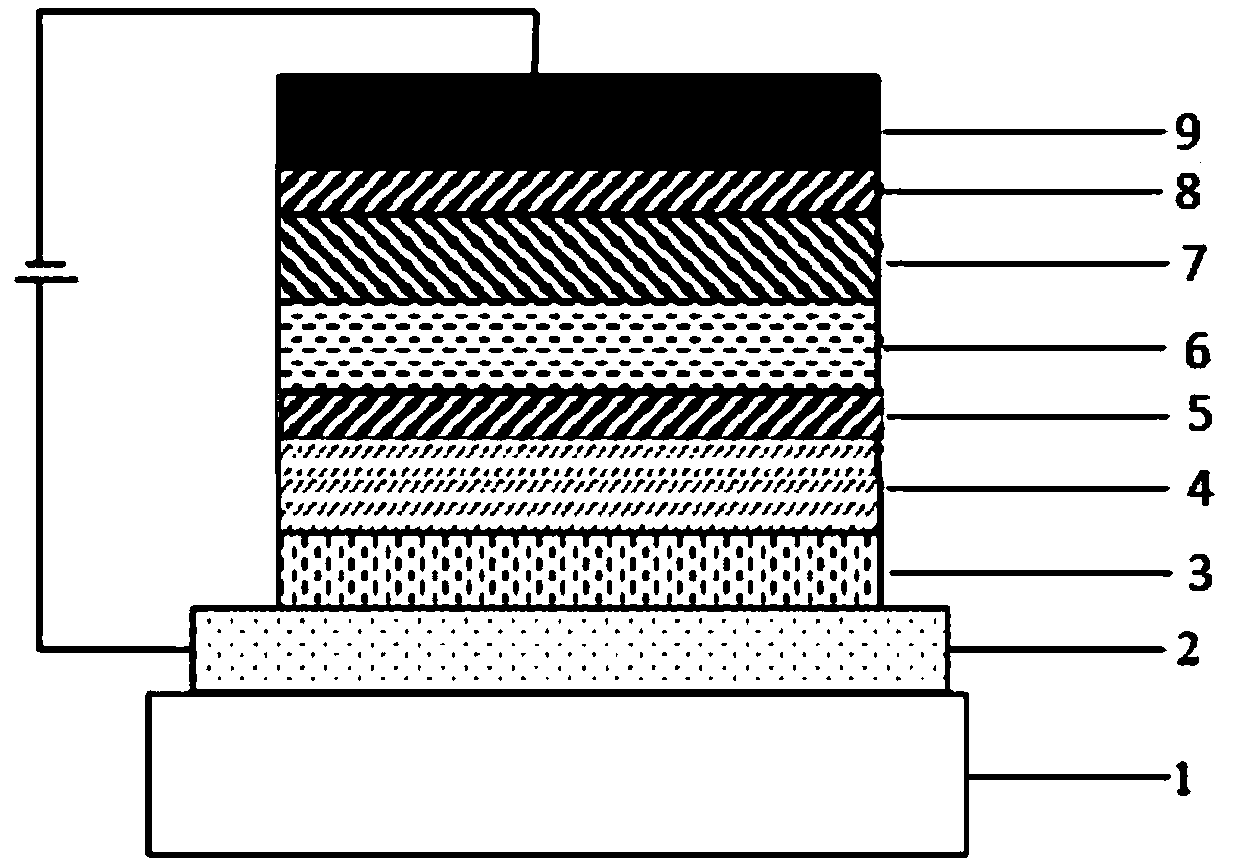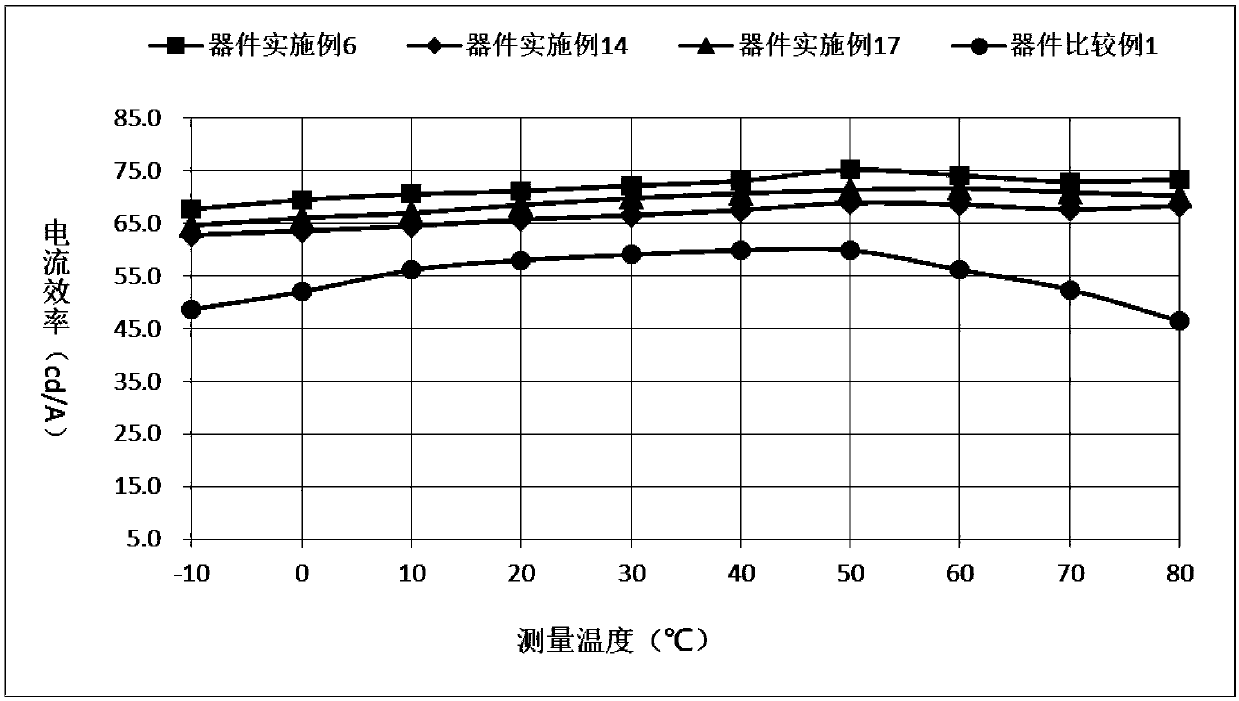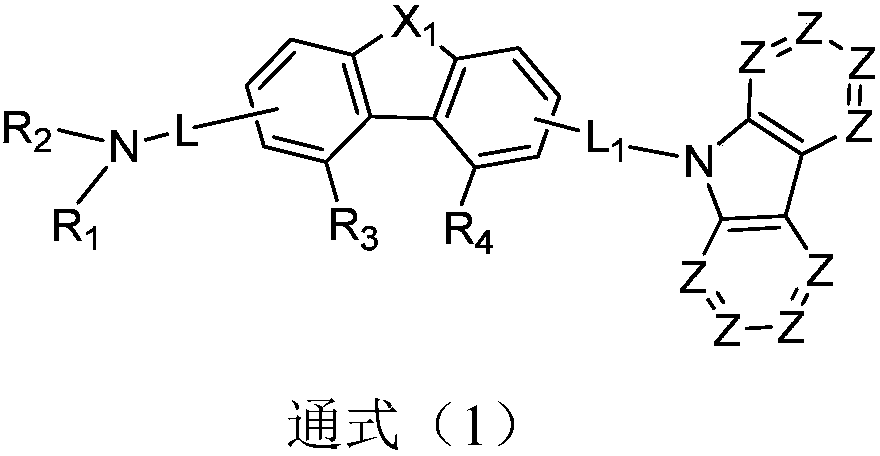Compound containing triarylamine structure, and organic light-emitting device prepared from same
A compound, triarylamine technology, applied in the field of organic electroluminescent materials, can solve different problems
- Summary
- Abstract
- Description
- Claims
- Application Information
AI Technical Summary
Problems solved by technology
Method used
Image
Examples
Embodiment 1
[0064] Embodiment 1: the synthesis of intermediate B1:
[0065]
[0066] In a 250ml three-neck flask, under the protection of nitrogen, add 0.01mol raw material 1-1, 0.012mol raw material 2-1, 150ml toluene and stir to mix, then add 5×10 -5 molPd 2 (dba) 3 , 5×10 -5 mol P(t-Bu) 3 , 0.03mol sodium tert-butoxide, heated to 105°C, refluxed for 24 hours, sampling plate, showed no bromide remaining, the reaction was complete; naturally cooled to room temperature, filtered, the filtrate was rotary evaporated to no fraction, passed through a neutral silica gel column , obtain target product intermediate B1; HPLC purity 99.37%, yield 73.4%; Elemental analysis structure (molecular formula C 24 h 19 N): theoretical value C, 89.68; H, 5.96; N, 4.36; tested value: C, 89.65; H, 5.99; N, 4.37. ESI-MS (m / z) (M+): The theoretical value is 321.42, and the measured value is 321.58.
Embodiment 2
[0067] Embodiment 2: the synthesis of intermediate D1:
[0068]
[0069] In a 250ml three-neck flask, under the protection of nitrogen, add 0.01mol of intermediate B7, 0.012mol of raw material 3-1, 150ml of toluene and stir to mix, then add 5×10 -5 molPd 2 (dba) 3 , 5×10 -5 mol P(t-Bu) 3 , 0.03mol sodium tert-butoxide, heated to 105°C, refluxed for 24 hours, sampling plate, showed no bromide remaining, the reaction was complete; naturally cooled to room temperature, filtered, the filtrate was rotary evaporated to no fraction, passed through a neutral silica gel column , to obtain the target product intermediate X1;
[0070] Under a nitrogen atmosphere, weigh 0.02mol of intermediate X1, 0.012mol of bis(pinacolate) diboron, 0.0002mol of Pd(dppf)Cl 2 1. Dissolve 0.05mol potassium acetate in toluene, react at 100-120°C for 12-24 hours, take a sample point plate, react completely, cool naturally, filter, and spin evaporate the filtrate to obtain a crude product, pass throug...
Embodiment 3
[0071] Embodiment 3: the synthesis of intermediate A1:
[0072]
[0073] In a 250ml three-neck flask, under the protection of nitrogen, add 0.01mol of raw material 4-1, 0.012mol of raw material 5-1, 150ml of toluene and stir to mix, then add 5×10 -5 molPd 2 (dba) 3 , 5×10 -5 mol P(t-Bu) 3 , 0.03mol sodium tert-butoxide, heated to 105°C, refluxed for 24 hours, sampling plate, showed no bromide remaining, the reaction was complete; naturally cooled to room temperature, filtered, the filtrate was rotary evaporated to no fraction, passed through a neutral silica gel column , obtain target product intermediate A1; HPLC purity 98.96%, yield 70.5%; Elemental analysis structure (molecular formula C 23 h 13 BrN 2 O): theoretical C, 66.84; H, 3.17; Br, 19.33; N, 6.78; O, 3.87; found: C, 66.86; H, 3.19; Br, 19.31; ESI-MS (m / z) (M+): The theoretical value is 413.27, and the measured value is 413.39.
[0074] The synthetic raw materials of Intermediate A, Intermediate B and Inte...
PUM
| Property | Measurement | Unit |
|---|---|---|
| Thickness | aaaaa | aaaaa |
Abstract
Description
Claims
Application Information
 Login to View More
Login to View More - R&D
- Intellectual Property
- Life Sciences
- Materials
- Tech Scout
- Unparalleled Data Quality
- Higher Quality Content
- 60% Fewer Hallucinations
Browse by: Latest US Patents, China's latest patents, Technical Efficacy Thesaurus, Application Domain, Technology Topic, Popular Technical Reports.
© 2025 PatSnap. All rights reserved.Legal|Privacy policy|Modern Slavery Act Transparency Statement|Sitemap|About US| Contact US: help@patsnap.com



